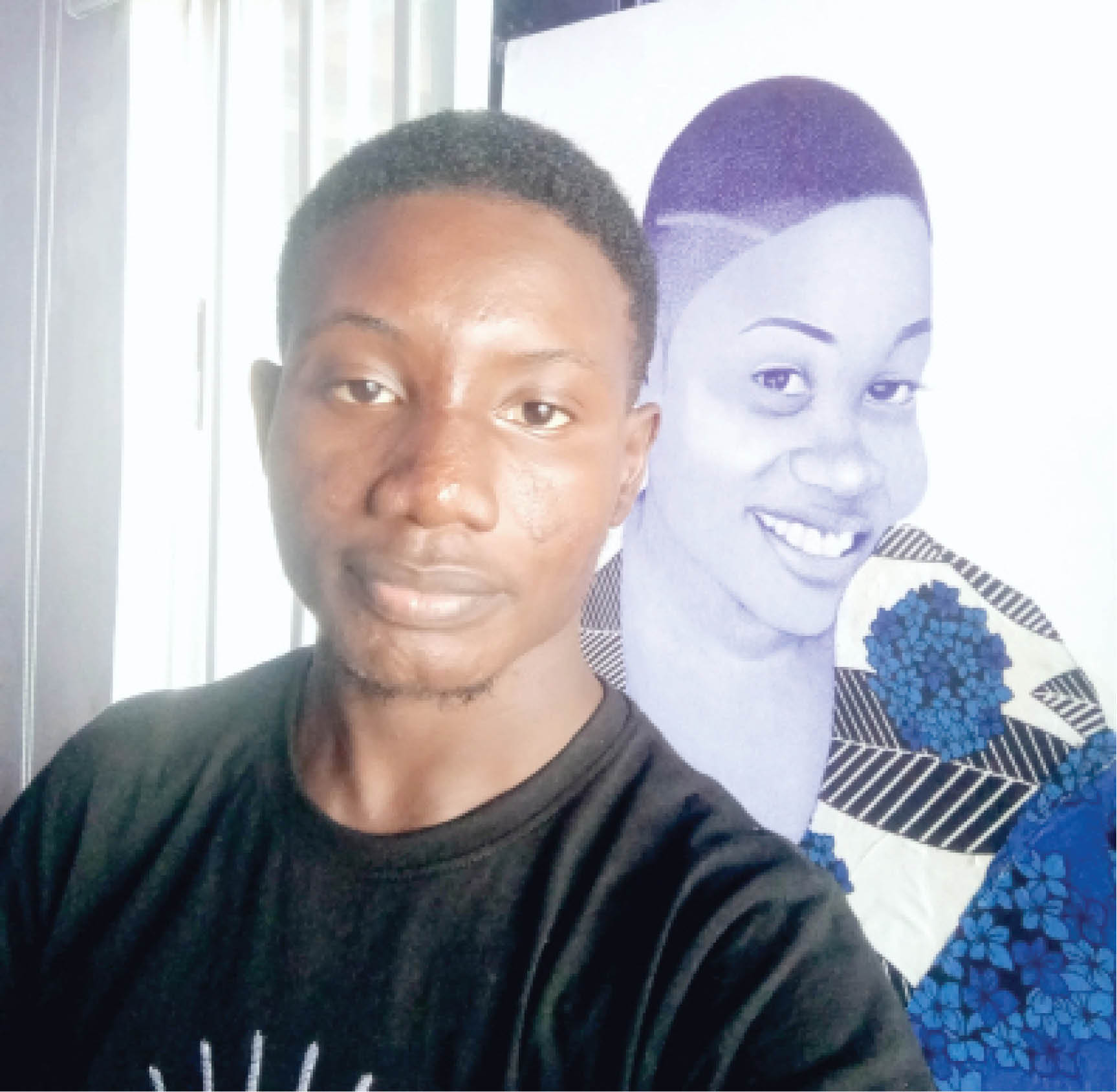Victor Obot is a Lagos-based artist and is studying Fine and Applied Art at the University of Benin, Edo State. He picked an interest in art during his early education in Lagos State and has not looked back since then. He is inspired by ‘Africanism’ which he coined from his interest in African abstract art and the cubic style. The artist is inspired by his thoughts, emotions, perception of his immediate environment and nature. He speaks on this and other issues that fuel his interest in art.
Why do you think art chose you?
Art chose me as it has always been a part of me since childhood. Though, while I was growing, due to stereotypes, I decided to drop art because I was made to see it as just a hobby. I decided to study International diplomacy but I was not offered the course when I applied at the university. But my sister, Ruth Obot, encouraged me to pick an interest in art. With her encouragement, I applied for Visual Art at the University of Benin and I was offered admission. With that opportunity, I was able to rekindle my interest in art professionally.
Do you see yourself dropping art for another profession?
I am focusing on my art when I graduate. Unlike when I saw art as a hobby, I am sure it is a big business with huge market and it has its own space. Art ranges from the collection, curating, to being a commercial/full-time studio artist. Art is really profitable. The misconception that art is not a high-income profession is being debunked daily as prominent young artists are being enlightened on its profitability. I will be into the art business and marketing when I complete my first degree.
What would you describe as the best thing you’ve gotten from art?
The best thing I have gotten from art is knowledge. Knowledge about the history of African art specifically as many young artists are not informed in this aspect lately. All thanks to artists like Prof. Freeborn Odiboh and other scholars, I discovered that art is beyond the practical aspect but it also focuses on the theoretical aspect. You should be able to defend your practice in words and in written form. Hence, you need to gather knowledge and have a statement about your art.

How have you been able to juggle between art and your studies?
I have a schedule that I have become used to. Most times, I do my art pieces overnight so it doesn’t affect my study time. Overall, it has been easy for me because I study what I do as a profession. My art and studies are interwoven and one improves the other.
Is art making you a better student or your studies is making you a better artist?
My studies are making me a better artist because the philosophy and knowledge in the art you create is within your level of knowledge in the art. So studying art educates me on things I didn’t know and broadens my knowledge. So, when next I make an art piece, I see overall improvements because my studies help me to better express my emotions and statements in my work.
What did you do to sharpen your skills, talent?
I studied and practised constantly; but more of study because when I keep practising without actually learning the important guidelines, there isn’t much growth. So studying more and practising afterwards has sharpened my skills.
There are cases of some artists taking up other jobs to survive, what is your survival plan?
My survival plan is still art. I do commissioned portraits with pen, fabric paintings and adire clothing. Art is a business that can even supply your daily need for survival.
As a budding artist, mentorship is ideal, who is your mentor and how has the mentor helped in refining your skills or perception about art?
My mentors are Dr. Nike Okundaye, Prof. Freeborn Odiboh, Clement Mmaduako Nwafor to mention a few. These three art geniuses have helped broaden my knowledge of African art history and appreciation of African attires and culture. My mentors have also helped in tackling challenges I face in the industry, especially some of the challenges that they have experienced. I get advice from them.
In what ways have you used your work in social advocacy especially mental health?
My interest in mental health is as a result of my intellectual expansion. From time immemorial, art has been used for healing and therapeutic purposes. I use art to help those that need special care; those with diseases that result in depression, anxiety disorder. As a member of the 2021 cohorts of the Art in Medicine Fellowship, which is held globally this year, I am learning new ways to infuse my art practice and experience into art therapy and mental rehabilitation. With the few arts I have made, I have been able to rekindle joyful memories and make people happier, find a greater meaning to life and I am still working on reaching out to more people through this initiative.
Tell us about the exhibitions you’ve attended?
I have attended quite a number of exhibitions like the “Eko culture” curated by Dr. Nike Okundaye. This exhibition was a celebration of Eko culture, not just visual art but also performing art. It made me appreciate the Eko art and culture with its importance. I also visited the exhibits at the National Museum, Benin City, and I discovered that art has been a source of income for people since the ancient time as they were called Guilds and most of Benin art were made for the Oba and his palace.
Recently, I visited Mentopedia – an exhibition on mental health at the Federal Neuro-Psychiatric Hospital, Yaba, Lagos which enlightened me on how art can be used for treatment and therapeutic purposes.
Several people were affected by COVID-19 especially with the lockdown, how were you able to go through the period?
It was the period I experienced swift improvements and excellence in my artistic practice as I had enough time to study and work. The period was also the beginning of my artistic career as I started doing commissioned artworks. So, the lockdown’s effect on me was positive.
How would you describe a particular day in your studio?
Every day in my studio is always fun and productive. Whenever I am in my art space, there’s always music to reflect the mood of the work I am about to do. Sometimes, it could be classical, country music.
How are artworks affected by the rise in commodities in Nigeria?
It has affected the sales because people are striving to survive before they can think of art. So, the increase affects art materials which also increase in price. This affects the artists and sales of artworks. Hence, there is a decline in the demand for artworks.
What do you think artists should do to remain relevant considering the high competitiveness of the profession?
Artists should be original and have a statement they are making with their art. They should have a unique style, brand that stands out and can easily be recognized as only theirs.
What drives you, prosperity or passion?
My passion for art drives me to be prosperous. Once I am passionate about what I do and I can add value through my art, I am bound to be prosperous.

 Join Daily Trust WhatsApp Community For Quick Access To News and Happenings Around You.
Join Daily Trust WhatsApp Community For Quick Access To News and Happenings Around You.


